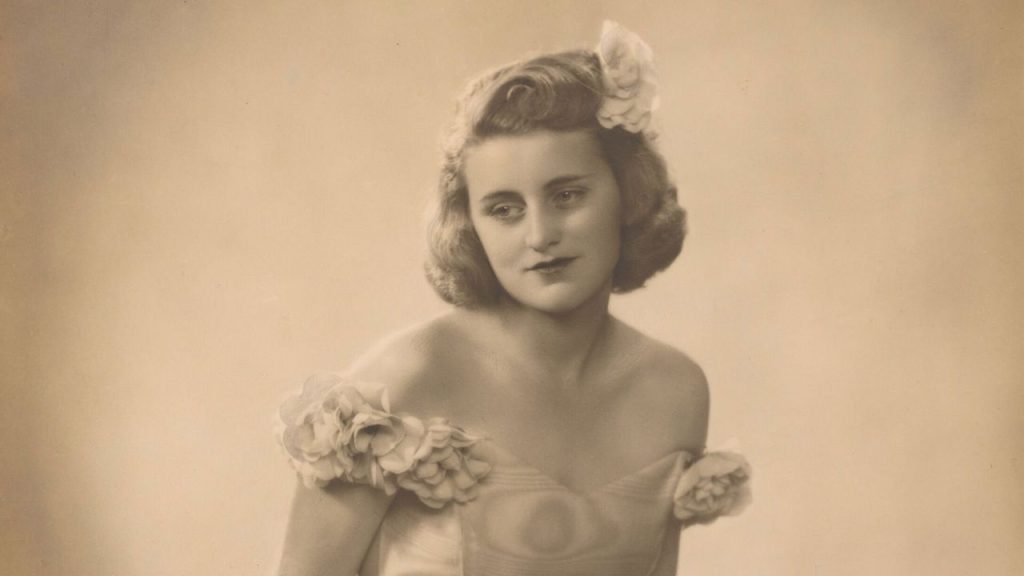Deborah’s sister Unity stalked Hitler in Munich at a restaurant he frequented during his rise to power. She eventually caught his eye and was taken into his innermost circle—a competitor of sorts to girlfriend Eva Braun. Remarkably, Unity met with Hitler on more than a hundred occasions and spent considerable private time with him as he consolidated his rule and began his campaign of territorial expansion. Unity stood next to Hitler in Vienna when he announced the Anschluss, or annexation of Austria, in March 1938.
Enter Kick Kennedy. At exactly this moment, she arrived in London with her family. President Franklin D. Roosevelt appointed Joe Kennedy Sr. as ambassador to the United Kingdom, a nod to a very wealthy contributor. Kick, 18, was part of a celebrated family with nine children. Joe Kennedy, though he deeply loved his children, used them as political props—group photos abound. Rose Kennedy yearned to make a splash in English society and saw an opportunity to do so with Kick’s “coming out” as a debutante during the 1938 London season. (Sister Rosemary joined, but she labored under substantial development disabilities.)
One woman, Lady Nancy Astor, Viscountess of Astor, became Kick’s unofficial sponsor in London. She was the most famous of American expatriates. “From the moment Nancy set eyes on Kick Kennedy,” one of Kick’s biographers, Paula Byrne, wrote, “she sensed a kindred spirit.” Nancy Astor fit the mold of a wealthy American woman marrying into the British aristocracy. Winston Churchill’s mother, Jennie Jerome, daughter of a prosperous American financier, was another example, marrying Lord Randolph Churchill, son of the Duke of Marlborough, in 1874.
The pattern of such mixed marriages arose not only because wealthy Americans coveted an aristocratic title and country estate, but also because, just as importantly, money was needed to run the massive estates. Further, many Brits of nobility perceived that their “stock” at times became “exhausted” through intermarriages and that the family needed to “refresh their blue blood by an infusion of red.”
“At such times,” Kick historian Barbara Leaming wrote, “instead of marrying aristocrats they chose their partners from other, presumably tougher and more vigorous strata of society.” The Kennedys fit that bill.
Rose Kennedy did not want her daughter marrying into the “aristocratic cousinhood,” as it was called, mainly because all of these families were staunchly Protestant and virulently anti-Catholic. So one wonders what she expected when she launched Kick into London society.
Kick, with all the charm, confidence, and charisma of her older brothers, was an instant sensation from the moment she was introduced by Nancy Astor at Cliveden, the Astor’s country house near Taplow, Buckinghamshire. At Cliveden, Astor maintained a salon that exercised considerable influence in many fields, notably foreign affairs (Nancy was the first woman seated as a member of parliament (MP), serving from 1919 to 1945—an achievement Kick deeply admired). Members of the group were called the “Cliveden set.”
This is where Kick met Debo Mitford. Both were debutantes and participated in a dizzying round of balls, dinners, teas, races, and regattas in the summer of 1938. Debo did dance with John F. Kennedy at a ball given by Lady Louise Mountbatten in July, and she recorded her thoughts on Kick’s brother in her diary: “Rather boring but nice”—an assessment that would later change. (Dancing was all the rage at these social events, and Kick held a more generous opinion of her brother’s prowess, addressing several letters to him during this period with “Dear Twinkle-toes.”)


